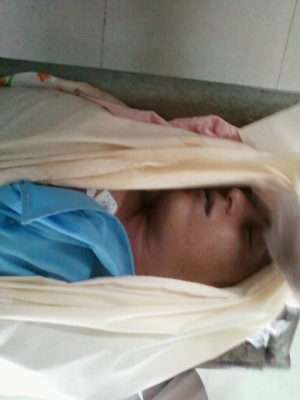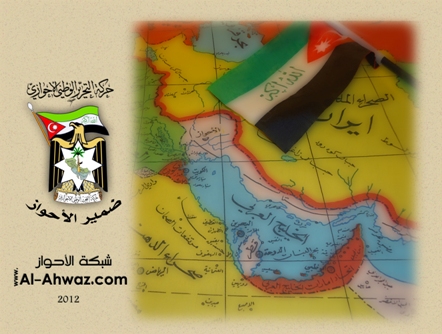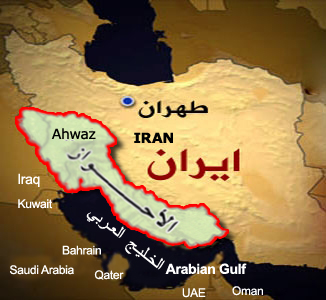 |
 قالت منظمة هيومن رايتس ووتش في بيان صدر اليوم
الثلاثاء 7من فبراير 2012 ان ايران تحتجز اكثر من
65 مواطن عربي في الأحواز بعد حملة امنية في
ولاية عربستان (الاحواز) جنوب غرب البلاد حيث بدأت
الحملة خلال الاشهر القليلة الماضية.
قالت منظمة هيومن رايتس ووتش في بيان صدر اليوم
الثلاثاء 7من فبراير 2012 ان ايران تحتجز اكثر من
65 مواطن عربي في الأحواز بعد حملة امنية في
ولاية عربستان (الاحواز) جنوب غرب البلاد حيث بدأت
الحملة خلال الاشهر القليلة الماضية.
جاء في بيان هذه المنظمة التي تأخذ من نيويورك
مقراً لها ان بعض الاعتقالات على الاقل تمت بناء
على خلفية كتابة على جدران مدينة السوس
( شوش) تشيد
بثورات الربيع العربي وتدعي بمقاطعة الانتخابات
البرلمانية المقبلة في ايران الذي من المفترض ان
تجري في 2 اذار/مارس القادم.
وأضافت هيومان رايتس ووتش ان رجلين يدعيان محمد
الكعبي (34 عاما) وناصر البوشوكة (19 عاما) توفيان
بسبب التعذيب الجسدي والنفسي .
واشارت المنظمة الى انه تم فرض "تعتيم" اعلامي على
الحملة الامنية في ايران والتي بدأت في تشرين
الثاني/نوفمبر2011 ومازالت مستمرة.
ودعت هذه المنظمة العالمية الى السماح للمحامين
والاقارب بمقابلة المعتقلين الاخرين، ومحاسبة اي
شخص مسؤول عن ممارسة التعذيب.
كما عبرت منظمة هيومان رايتس ووتش عن قلقها إزاء
المعتقلين ومواجهتم بتهم الارهاب والتجسس والعمل
ضد الامن القومي الامر الذي قد يؤدي الى اعدام
هؤلاء.
وفقاً لهذا البيان كانت قد بدأت الاعتقالت بإعتقال
الفنان غالب منابي و اخيه حسن منابي وذلك في 28
تشرين الماضي واستمرت بإعتقال اكثر من 18 شخص في
مدينة الحمدية (25 كم غرب الاحواز عاصمة
القطر ).
كما جاء في البيان أن حسن منابي استاذ تاريخ في
مدارس الاحواز وناشط ثقافي بارز حيث اعتقل عدة
مرات قبل ذلك ويذكر ان اولى اعتقال له في عام 2005
حيث خضع للتعذيب الجسدي والنفسي واستمرت
الاعتقالات الاخرى في حقه الامر الذي أدى بمنابي
للخروج من البللاد والتوجه الى تركيا لطلب
اللجوءوذلك في عام 2010.
ونقلت هيومان رايتس واوتش عن حيثيات اعتقال منابي
بعد اعتقال زوجته كرهينة في الاستخبارات و الضغط
على افراد اسرته لرجوع حسن من تركيا الى الاحواز
الامر الذي ادى برجوع منابي واعتقاله برفقة اخيه
المغني غالب منابي .
كما اتهمت السلطات الايرانية حسن منابي بالتجسس
لصالح الولايات المتحدة وبناء علاقات مع المعارضة
الاهوازية في المنفى.
جاء في بيان هيومان رايتس ووتش نقلاً عن نشطاء في
الاحواز أن بدأت اعتقالات مدينة الحميدية في يناير
2012 وتتراواح أعمار المعتقلين مابين الـ20 حتى 28
عاماً و تم اطلاق سراح احد المعتقلين بكفالة
مالية.
 واعتقلت قوى الامن في مدينة السوس
(شوش)التي تقع
115 كم شمال الاحواز عاصمة القطر
والتي تقطنها
غالبية عربية مالايقل عن 27 شخص، توفى احدهم يدعى
محمد الكعبي (34 عاما) تحت التعذيب النفسي والجسدي
في مركز استخبارات هذه المدينة.
واعتقلت قوى الامن في مدينة السوس
(شوش)التي تقع
115 كم شمال الاحواز عاصمة القطر
والتي تقطنها
غالبية عربية مالايقل عن 27 شخص، توفى احدهم يدعى
محمد الكعبي (34 عاما) تحت التعذيب النفسي والجسدي
في مركز استخبارات هذه المدينة.
يقول البيان أن احد موظفي مركز الاستخبارات في
المدينة اتصل وبلغ اسرة الكعبي ان رفات محمد
الكعبي دفنت في مكان ما وليس هناك اي حاجة لخدمات
الدفن وحذر هذه العائلة من اجراء حداد على ابنهما.
كما يذكر البيان ان ناصر البوشوكة (19 عاما) قتل
تحت التعذيب الجسدي و النفسي في معتقل الامن في
مدينة الاحوز تحت ظروف غامضة وأسباب غير معروفة.و
بما ان تم تحديد هوية المقتول ناصر البوشوكة على
يد ابيه و مشاهدة أثار التعذيب على جسده الا ان
السلطات لم تسلم رفات البوشوكة لأسرته لحد الان .
يضيف البيان أن نشطاء اخرين أكدوا ان السلطات
الايرانية اعتقلت 11 شخص من اهل السنة والجماعة في
الاحواز العاصمة وضواحيها منذ 17 يناير ومازالو
قيد الاعتقال. وكانت قد تلقت هيومان رايتس واتش
عدد كبير من اسماء المعتقلين في الاحواز ولكن بسبب
ممانعة السلطات الايرانية بقيام منظمات حقوق
الانسان والاعلام الحر والحيادي بزيارة الاحواز لن
تستطيع هذه المنظمات بالتحقيق في مزاعم انتهاكات
خطيرة تطال المواطنين العرب هناك .
وقال جو ستورك مدير شمال افريقيا والشرق الاوسط في
هيومان رايتس ووتش أن لدينا قلق كبير حيال ما يحدث
في الاحوز من اعدامات سرية وانتهاكات تطال حقوق
المواطنين هناك.
كما جاء في البيان ان النشطاء هاشم شعباني و هادي
راشدي و السيد حيدريان الذين اعتقلو في مدينة
الخلفية(خلف اباد) اجبروا بالاعتراف امام
الكاميرات وتم بث فلم وثائقي من قناة برس تي في
الايرانية يتهم هؤلاء وغيرهم من نشطاء عرب بعمليات
ارهابية.
كما يذكر البيان ان السلطات الايرانية اعدمت 7
شباب عرب وصبي في الـ16 من العمر في سجون الاحواز
في الفترة مابين 4 مايو و7 ايار الماضي وطالبت
السلطات الايرانية بفتح تحقيقات مستقلة وشفافة في
عمليات القتل المزعومة.
 جاء في بيان هيومان رايتس ووتش أن قوى الامن في
الاحواز فتحت النار على المتظاهرين في ابريل نيسان
الماضي (2011) وقتلت ما لايقل عن 50 شخص متظاهر و
اعدمت قبل ذلك العشرات من العرب وشددت قبضتها
الامنية لإسكات العرب في لقطر
.
جاء في بيان هيومان رايتس ووتش أن قوى الامن في
الاحواز فتحت النار على المتظاهرين في ابريل نيسان
الماضي (2011) وقتلت ما لايقل عن 50 شخص متظاهر و
اعدمت قبل ذلك العشرات من العرب وشددت قبضتها
الامنية لإسكات العرب في لقطر
.
يقع عربستان(الاحواز) في جنوب غرب ايران
تغطنه اغلبية عربية ويعد أهم
القطر في المنطقة حيث
تتوفر فيه الموارد الطبيعية بشكل كبير والمصدر
الرئيسي للميزانية الايرانية التي تعتمد على
النفط.
يشهد الاقليم منذ 15 نيسان 2005 احتجاجات ومظاهرات
متواصلة تهدف لأيصال صوت المواطنين العرب الى
العالم بغية نيل حقوقهم السياسية والاقتصادية
والاجتماعية كما ان هناك فصائل عربية تطالب
بالفدرالية واخرى بالاستقلال عن ايران.
النسخة الاصلية لبيان هيومان
واتش من موقع المنظمة :
http://www.hrw.org/news/2012/02/07/iran-arrest-sweeps-target-arab-minority
Iran: Arrest Sweeps Target Arab Minority
Dozens Held; 2 Have Died in Custody
FEBRUARY 7, 2012
(New York) – Iranian
security forces arrested more than 65 Arab
residents during security sweeps in Iran’s
Arab-majority Khuzestan province since late 2011
according to local activists, Human Rights Watch
said today. The Iranian government should
immediately charge or release those arrested,
Human Rights Watch said. Authorities should also
investigate reports by local activists that two
detainees have died in Intelligence Ministry
detention facilities in the past week.
Reports
by local activists about security sweeps in the
towns of Hamidiyeh, Shush, and Ahvaz indicate
that authorities carried out at least some of
the arrests in response to anti-government
slogans and graffiti spray-painted on public
property expressing sympathy for the Arab Spring
and calling for a boycott of Iran’s
parliamentary elections, scheduled for March 2,
2012. Human Rights Watch received information
that Mohammad Kaabi, 34, and Nasser Alboshokeh
Derafshan, 19, died in detention facilities run
by local intelligence officials in Shush and
Ahvaz respectively, apparently as a result of
torture. The local activists say that most of
those arrested are being held in incommunicado
detention.
“There has been a blackout inside Iran on this
latest round of arrests targeting Arab
protesters and activists,” said Joe Stork,
deputy Middle East director at Human Rights
Watch. “Authorities should immediately divulge
the reasons for the arrests, give detainees
access to family members and lawyers, bring all
detainees promptly before a judge, and hold
anyone responsible for torture to account.”
Human Rights Watch expressed concern for those
in custody. Based on past government actions
some of those arrested could be at imminent risk
of execution if they are convicted by
revolutionary courts of national security crimes
including terrorism or espionage, or face
prosecution on such charges. Human Rights Watch
is not aware of any charges that have been
brought in these cases.
According to several Iranian Arab rights groups,
security forces have since November 2011
arrested at least 18 Arab men in Hamidiyeh, 25
kilometers west of Ahvaz, the provincial
capital. The first arrest, on November 28, was
of the prominent activist Hasan Manabi, an
elementary school principal, and his brother
Ghabel. A close friend of Hasan Manabi told
Human Rights Watch that security and
intelligence forces had arrested him numerous
times since 2005. He said that Manabi, who had
told the friend about torture and ill-treatment
at the hands of intelligence officials following
earlier arrests, had decided in late 2010 to
seek asylum in Turkey.
Manabi’s friend told Human Rights Watch that the
Intelligence Ministry summoned and detained
Manabi’s wife for several days to pressure him
to return to Iran. Manabi returned in September
2011 and introduced himself to intelligence
officials in Ahvaz, who interrogated him, then
released him after several hours. But on
November 28 intelligence agents raided Manabi’s
home and arrested him and his brother Ghabel.
The authorities have since accused Hasan Manabi
of spying for the United States and the United
Kingdom, in addition to having ties with Arab
opposition groups operating in Khuzestan
province.
A local Khuzestan activist told Human Rights
Watch that the latest round of arrests in
Hamidiyeh began when security forces arrested
nine Iranian Arabs on January 10 and four more
on January 26 and 30. Most are between ages 20
and 28, and some had previously been detained
for participating in demonstrations demanding
more rights for Iran’s ethnic Arab minority. At
least one has been released on bail, the local
activist said, and several others have since
been arrested.
Authorities have also arrested at least 27
people in Shush, 115 kilometers northwest of
Ahvaz, in recent weeks. A local activist there
said that security forces, including
plainclothes members of the Intelligence
Ministry, initiated the arrests in response to
anti-government slogans and graffiti
spray-painted on public property expressing
sympathy for the Arab Spring and calling for a
boycott of Iran’s parliamentary elections,
scheduled for March 2. The activist said that
security forces set up checkpoints throughout
Shush. After they arrested Jasim Kaabi, his
daughter Khadijeh, and his son Mohammad in their
home on January 21, he said “people became angry
and poured into the streets.” In response,
security forces arrested at least 24 men, most
of them in their 20s, on January 25 and 26. The
arrests took place in Ahmadabad, Khazireh, Davar,
and several villages outside of Shush.
“For about four days [from January 25] Shush was
effectively under martial law, which has since
been lifted,” the activist said. “But the city
is still under a heavy security presence.”
The local activist told Human Rights Watch that
Mohammad Kaabi, who was arrested in Shush on
January 21, died in custody at a local
Intelligence Ministry detention facility. The
local activist confirmed reports from other
activists that on February 2 authorities from
the Shush Intelligence Ministry office contacted
Kaabi’s family and informed them that he had
died. The official reportedly told the family
that authorities had already buried Kaabi’s
remains and there was no need for funeral
services. They warned the family not to conduct
a public mourning service for their son.
Prior to news of Kaabi’s death, local activists
told Human Rights Watch that 19-year-old Nasser
Alboshokeh Derafshan had allegedly died after
being tortured on January 30 in an Intelligence
Ministry detention facility in Ahvaz. A source
close to Derafshan’s family told Human Rights
Watch that security forces arrested Derafshan on
January 26 for unknown reasons.
On January 30, agents from Ahvaz’s Intelligence
Ministry called Derafshan’s father and told them
to come pick up him up, the source said. When
his father arrived at the detention facility, he
caught a glimpse of a body inside the ambulance
parked there and asked if it was his son, but
the authorities denied it. He followed the
ambulance to Golestan hospital and discovered
that the body in the ambulance was his son’s.
The source told Human Rights Watch that
Derafshan’s family saw signs of torture on his
body, including bruises on his face, neck,
waist, and ribs. The authorities claim that
Derafshan died of natural causes.
The source told Human Rights Watch that
authorities have so far refused to return
Derafshan’s body to his family.
Local activists also told Human Rights Watch
that intelligence agents have arrested at least
11 Arab men in and around Ahvaz since February
3. Security forces arrested another 10 Arab men,
all of whom are members of the Sunni sect, on
January 17, activists said. One of them told
Human Rights Watch that security forces, many of
them plainclothes agents, are present throughout
Ahvaz and the situation there is very tense.
Human Rights Watch has received the names of
many of those arrested or killed, but has not
been able to verify the circumstances of each
arrest due to severe government restrictions on
independent monitoring and reporting in the
province. Human Rights Watch previously called
on Iranian authorities to allow independent
international media and human rights
organizations access to investigate allegations
of serious rights violations in the province.
“Security operations in Khuzestan province since
protests there last April have resulted in the
largest number of deaths and injuries since the
crackdown that followed the disputed 2009
presidential election,” Stork said. “With the
province under an information blackout and the
history of secret convictions and executions, we
have reason to be very worried about the people
the authorities have been snatching up and
carrying off there.”
Background
 Khuzestan province, where much of Iran’s oil and
gas reserves are located, has a large ethnic
Arab population believed to number more than 2
million, possibly a majority of residents.
Despite Khuzestan’s natural resource wealth,
ethnic Arabs have long complained about the lack
of socioeconomic development in the region. They
also allege that the Iranian government has
systematically discriminated against them,
particularly in employment, housing, and civil
and political rights.
Khuzestan province, where much of Iran’s oil and
gas reserves are located, has a large ethnic
Arab population believed to number more than 2
million, possibly a majority of residents.
Despite Khuzestan’s natural resource wealth,
ethnic Arabs have long complained about the lack
of socioeconomic development in the region. They
also allege that the Iranian government has
systematically discriminated against them,
particularly in employment, housing, and civil
and political rights.
The arrests in Hamidiyeh, Shush, and Ahvaz are
the latest in an intense government security and
media campaign over several years targeting
Khuzestan Arab residents and activists. The
government routinely alleges that Arab rights
activists and protesters engage in terrorism and
espionage, or are tied to armed Arab separatist
groups. On December 13, 2011, Press TV, a
government English-language station, aired a
documentary featuring three Arab men who
confessed before the cameras that they had
carried out terrorist activities. The program
alleged that the men – Hadi Rashedi, Hashem
Shaabani, and Taha Heidarian – were part of a
group called ‘Khalq-e Arab,’ supported by US and
UK interests and foreign-based Iranian Arabs who
fronted as human rights activists.
A source who knows both Rashedi and Shaabani
told Human Rights Watch that the two men are
among more than 10 others from the town of
Khalafabad, located about 120 kilometers
southeast of Ahvaz, who have been arrested and
detained by authorities since January 2011. He
said he believes the men were forced to confess
to these crimes after being subjected to
physical and psychological torture.
In April 2011, Human Rights Watch documented the
use of live ammunition by security forces
against protesters in cities throughout
Khuzestan province, killing dozens and wounding
many more. No Iranian official has been held to
account for these killings.
Authorities also arrested several hundred
demonstrators and rights activists, some of whom
are still in detention, and executed at least
seven Arab men and a 16-year-old boy in Ahvaz’s
Karun prison between May 4 and May 7, Iranian
Arab rights groups reported. Local rights
activists have told Human Rights Watch that at
least some of those executed had been arrested
only weeks before, during the April protests.
Activists say that at least four others died in
custody between March and May. The authorities
should open independent and transparent
investigations into all alleged killings, Human
Rights Watch said.
The April 2011 protests were held to mark the
sixth anniversary of 2005 protests in Khuzestan,
in which security forces opened fire to disperse
demonstrators in Ahvaz and other cities and
towns, killing at least 50 protesters and
detaining hundreds. The 2005 crackdown led to a
cycle of violence throughout Khuzestan province,
including several bomb attacks in June and
October 2005 and January 2006 that killed 12
people. In response, the government imprisoned
numerous activists it claimed were Arab
separatists responsible for terrorist attacks
against civilians and sentenced more than a
dozen people to death on terrorism-related
charges. Since 2006, authorities have executed
at least 19 Iranians of Arab origin.
Names of People Reported Arrested in Khuzestan
Province Since November 2011 (provided by local
activists)*
Shush: Qasem Badavi, Jaajaa Chenani, Aadel
Dabbat, Ahmad Dabbat, Ashur Dabbat, Faisal
Dabbat, Kazem Dabbat, Ebrahim Heidari, Hamid
Kaabi, Jaafar Kaabi, Jasem Kaabi, Karim Kaabi,
Khadijeh Kaabi (female), Mohammad Kaabi (died in
detention), Sajjad Kaabi, Ali Kenani, Abbas
Khasraji, Mehdi Khasraji, Moslem Mazraavi,
Morteza Mousavi, Hasan Navaseri, Mehdi Navaseri,
Salar Obeidavi, Amir Sorkhi, Adnan Zoqeibi,
Ahmad Zoqeibi, Osman Zoqeibi
Hamidiyeh: Hasan Abiat, Jalil Abiat, Jamal Abiat,
Aadel Cheldavi, Adnan Cheldavi, Karim Doheimi,
Ali Heidari, Mohammad Adnan Helfi, Ghabel Manabi
(arrested November 2011), Hadi Manabi, Hasan
Manabi (arrested November 2011), Seyed Faraj
Mousavi (released on bail), Heidar Obeidavi,
Khaled Obeidavi, Ayoub Saedi, Emad Saedi, Abbas
Samer, Eidan Shakhi
Ahvaz (and vicinity): Ahmad Afravi (Sunni),
Nasser Alboshokeh Derafshan (died in detention),
Majid Bavi (Sunni), Abdolvahid Beit Sayyah
(Sunni), Valid Hamadi, Qazi Handali Farhani
(Sunni), Jamal Hazbavi (Sunni), Tofiq Heidari,
Hamid Khanfari Batrani (Sunni), Hossein Khazraji
(Sunni), Said Khazraji (Sunni), Jasem Marvani,
Taher Moaviyeh, Mohammad Naami, Seyed Ahmad
Nazari (Sunni), Aadel Saedi, Hossein Savari, Ali
Sayyahi, Ali Sharifi, Sadoun Silavi, Khalaf
Zobeidi (Sunni)
*This list is not exhaustive and Human Rights
Watch could not independently verify whether the
individuals listed remain in detention.